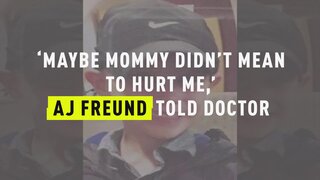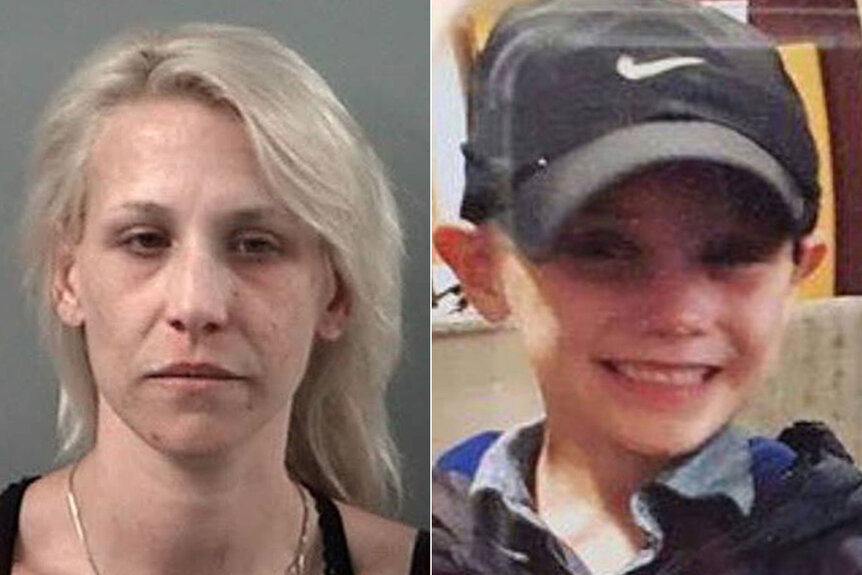Create a free profile to get unlimited access to exclusive videos, breaking news, sweepstakes, and more!
What Drives Some Parents To Abuse Their Kids To The Point Of Death?
The death of Andrew "AJ" Freund, allegedly at the hands of his parents, has shined a light on the phenomenon of filicide.

The recent killing of 5-year-old Illinois boy Andrew "AJ" Freund, who authorities say died at the hands of his parents, has left a number of serious questions: could more have been done to protect him? And, if the allegations against his parents are true, what could have driven them to act in such a brutally cruel way toward their child?
JoAnn Cunningham, 36, and Andrew “Drew” Freund Sr., 60, have been each charged with five counts of murder in AJ's death. Prosecutors say he was forced to sit in a frigid shower before being beaten so badly he died. His parents allegedly became irate that the boy lied about soiling himself, precipitating the fatal punishment.
It wasn’t the first time the parents were investigated for alleged abuse. Records released by the Illinois Department of Children and Family Services and obtained by Oxygen.com revealed the agency looked into several reports of abuse and neglect, but each time those claims were determined to be "unfounded." Video of a badly bruised AJ was allegedly found on his mother’s cellphone, taken a month before he died showing her berating him over wetting his bed.
Dr. Ziv Cohen, clinical assistant professor of psychiatry at Weill Cornell Medicine, described to Oxygen.com that there are different kinds of filicide, the killing of one’s own child or children. One such category known as fatal abuse. He said that is when the abuse reaches such a fervor and pitch that the parents accidentally kill the child.
“They didn’t necessarily intend to kill the child but the chronic abuse reached such a fervor and pitch that there was a loss of control, that the child sustained severe injuries, that parents suddenly realize that they killed their own child," Cohen explained.
In these kind of cases, the "victims of fatal abuse filicide are often young, unwanted children," according to a 2007 study entitled "A Review of Maternal and Paternal Filicide."
He said while occasionally a child will be beaten to death the first time they are abused, typically there is a strong history of abuse prior to it.
"So that speaks to issues of warning signs and what can be done to prevent these things from happening,” he said.
Cohen said that parents who are chronic abusers typically exhibit less remorse than those who end up killing their child in different circumstances, such as during a psychotic episode. One indication of remorse is suicide attempts: chronic abusers are less likely to try to kill themselves than other parents responsible for their child's death, according to Cohen.
"Psychosis and suicide attempts are not characteristic of women who fatally abuse their children," the study referenced above states. It also adds that parental suicide attempts are not characteristic of fatal abuse filicide in general.
Cohen said that often parents who fatally abuse their child have been the victims of severe abuse in their own life; they may exhibit personality disorders; and may struggle with substance abuse. Additionally such parents are dealing with both marital and economic stress.
They also may not tolerate frustration well.
According to an affidavit obtained by the Chicago Tribune, Cunningham “complained about AJ as not getting better from what she had previously self-diagnosed or likened to oppositional defiance disorder (ODD).”
Cohen said that this particular claim speaks to one characteristic typical with fatal abuse: a low frustration threshold. He said if AJ didn’t actually have this disorder, “and she was just labeling him, you could say this is a parent who is very frustrated by their child, who may be exhibiting normal behavior of a child and she’s getting more and more frustrated and labeling him as a problem child.”
That being said, Cohen cautions that he cannot speak to specifics of that Freund case as he is not personally involved with it.
He added, however, that if someone was to berate a child for, say, wetting their bed or soiling themselves, it could speak to a low frustration tolerance.
Cohen said lying is another warning sign of parents who are chronic abusers.
“The children may be full of bruises and scars and all kinds of indication that they’re being abused and there is a culture of lying in the family and of teaching the children to lie and lying to others to maintain an image of normalcy while horrific abuse is happening in the home.”
Lying can include “persistent denial in the face of overwhelming evidence,” he added.
Cohen said both medical professionals and agencies like the Department of Children and Family Services “need to be trained to recognize patterns of injury that suggest abuse and they need to have a high suspicion for the potential for abuse."
AJ had been removed from his home by authorities and taken to the emergency room back in December with bruising on his hip - an injury that would later be attributed to his family's dog pawing at him.
Often, Cohen said that children will give implausible explanations for their bruises and scars, which they’ve been coached to offer by their parents.
“Because they are children and they don’t know how to lie with consistency, they are very often going to slip in their explanations and give you a hint for what’s really going on so you want to take seriously what the child is telling you,” he said.
He said that even when the abusive parent views the victim as a problem child, typically the abused children are more docile and eager to please than the average child.
“They also tend to be protective of their parent and they tend to rationalize the abuse,” Cohen explained.
When AJ was brought to the ER in December with that hip bruise, “the doctor was concerned because Andrew stated that, 'Maybe someone hit me with a belt. Maybe mommy didn’t mean to hurt me,’” according to Illinois Department of Children and Family Services records obtained by Oxygen.com.

























